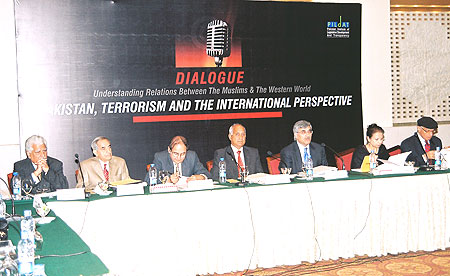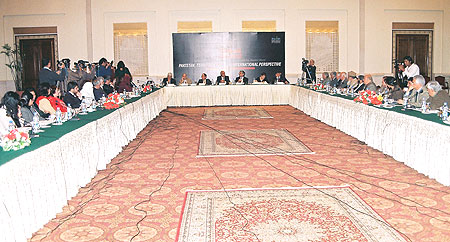|
|
| |
| EVENTS |
|
|
> State and Society Must Reconcile on Causes of Terrorism to Address the Crisis
PILDAT Roundtable Discussion: Pakistan, Terrorism and the International Perspective |
| |
|
Dialogue Series
December 22, 2008
Lahore
|
|
| |
Lahore, December 22; Deep fissures exist in the society on what are and have been the causes of terrorism. While Pakistan must move quickly to address the crisis developing out of internationally-perceived terrorism-Pakistan nexus, the first step towards addressing the issue will be for the society to reconcile with what are the reasons of terrorism, believed foreign and local experts and participants of the PILDAT Roundtable on Pakistan, Terrorism and the International Perspective that was held at Lahore today. |
|
| |
Foreign experts and MPs who especially arrived in Pakistan at the invitation of PILDAT to take part in the Dialogue included Dr. Ashraf Choudhary, QSO, MP, New Zealand Parliament and Dr. Farzana Shaikh, South Asia Expert, Chatham House, UK. Pakistani speakers at the roundtable discussion included Dr. Hasan-Askari Rizvi, Defence and Political Analyst; Lt. Gen. (Retd.) Nishat Ahmed, Former Commandant NDC, Dr. Saeed Shafqat, Professor & Director, Centre for Public Policy & Governance (CPPG) Forman Christian (college) University; Adjunct Professor, School of International Affairs and Public Policy (SIPA), Columbia University, NYC, USA and Mr. Shamshad Ahmad, Former Foreign Secretary of Pakistan.
|
|
| |
A large number of public representatives, scholars, media persons, academicians and young professionals took part in the roundtable discussion. Prominent among the participants were Mr. Majid Nizami, Mr. Ehsan Wayne, Maj. Gen. (Retd.) Sikandar Shami, Mr. Fareed Piracha, Justice (Retd.) Khalil ur Rehman Khan, Ms. Faryal Gauhar, Dr. Mohammad Waseem, Ambassador (Retd.) Eqbal Ahmed, Mr. Abdul Rauf, Mr. Sohail Warraich, Mrs. Bushra Aitzaz, Ms. Arifa Khalid, Mr. Ata-ur-Rehman and Ms. Mehr Bukhari, etc. |
|
| |
There exist 2-3 major schools of thought that attempt to explain phenomenon of terrorism in Pakistan. There is a considerable size of society that believes terrorism is mainly a reaction to the excesses of the West against Muslims of the World. Yet another group that considers terrorism is a home-grown phenomenon as a state policy and a considered strategy. The third group, the pluralists, are those that are trying to bridge the gap between the two and wish to move forward with finding a solution to the perception that Pakistan is the epicenter of world terrorism. |
|
| |
Speaking at the roundtable, Dr. Hasan-Askari Rizvi said that we must realize that in today�s international setting, the world has zero tolerance for terrorism and those harbouring and promoting terrorism therefore whether it is non-state actors in Pakistan who are perceived to be perpetrators, it is the state�s responsibility to curtail and contain them. Pakistan�s policymakers, civil and military, should also understand that there is a huge cost of state�s own instability. He said that the presence of root causes in a society does not always mean there will be terrorism. In the case of Pakistan, there has been a conscious effort to promote terrorism, either by the state or by non-state groups. He said that it was unfortunate that a justifications for such groups is given in Pakistan without acknowledging Pakistan�s responsibility as a nation-state. There is a great tendency in Pakistan to externalise this issue which makes it difficult for Pakistan to realize what is wrong with Pakistan�s own society. He said that militancy was a strategy for Pakistan government but strategies change whereas for these groups, militancy has become an article of faith. Pakistan�s government faces a challenge of direction today and it has to decide which course it wishes to adopt and what will be the consequences of each of these roads. |
|
| |
Dr. Ashraf Choudhray said that New Zealand is the only country which took a stand against the invasion of Iraq and chose not to be part of the �coalition of the willing. It was the first time that the country went against its kith and kin in United Kingdom as the country considered it morally wrong to invade Iraq. He said that Pakistan faced a series of crises and the country needed to look inwards for finding the answers. He praised PILDAT�s efforts and said that the way forward for the country is to invest in the education of the people and develop a culture of research and scholarship in the society and the media. |
|
| |
Dr. Farzana Shaikh said that there can be no excuse for killing of innocent people therefore the whole concept of �causes� of terrorism is somewhat misplaced. She said that Pakistan�s �strategy� of dealing with Indian hegemony can be one factor but we should not confuse between political violence and terrorism as one thing. |
|
| |
Mr. Shamshad Ahmad stressed that Pakistan needed to understand its obligations and responsibilities as a sovereign state in deciding which course to adopt. |
|
| |
Succinctly analyzing the topic under discussion, Dr. Saeed Shafqat said that we need to understand the linkages behind policies in order to understand the complexities of today�s international consensus against terrorism. He said that the concept of sovereignty is �organised hypocrisy� in the case of Pakistan as the elite are completely on board with what the state�s goals and policies should be. He said that we should seriously reconsider the role of United States in an objective light and study merits and de-merits of US influence or US role in Pakistan. He believed that despite very bleak times, the hopeful scenario was the pluralistic debate that is taking place in society.
Participants at the roundtable engaged in a live and enriching discourse with the panel and amongst themselves. PILDAT�s role was appreciated in providing an avenue for fostering and facilitating debate on what is termed as the key issue faced by the country.
Introducing the roundtable topic and welcoming the guests, Mr. Ahmed Bilal Mehboob, PILDAT Executive Director said that PILDAT launched a programme of Dialogue on Understanding Relations between the Muslim World and the West with a special focus on Pakistan in an effort to promote a broader understanding of reasons and issues affecting Pakistan�s relations as a majority Muslim country with the Western Word at large and how those could be resolved. He acknowledged the support provided by the Global Opportunities Fund, Foreign and Commonwealth Office (FCO), UK in hosting the dialogue series. The first Dialogue of this series was held by PILDAT in Pakistan in 2006 between a group of young US State Senators and a diverse set of Pakistanis around the country. Another part of the Dialogue Series was organised by PILDAT by inviting young British political leaders from UK to interact with a diverse group of Pakistani Youth belonging to 4 different provinces of Pakistan and held in the four provincial headquarters and in the Federal capital. Young office-bearers of the British�s Labour Party, Conservative Party, Liberal Democrats, Scottish Nationalist Party and from Ireland�s main political party took part in this dialogue with the young leadership of Pakistan. In April 2008, PILDAT held another round of Dialogues by inviting Western legislators of Pakistani origin to Pakistan to interact with their counterparts and a select group of Pakistanis and aimed at discussing various challenges faced by Pakistan as a majority Muslim country vis-�-vis its relations with the West. PILDAT sought to involve legislators of Pakistani origin, given their understanding of not only Pakistan but their political and legislative roles in Western democracies, to engage with their Pakistani counterparts, intellectuals and the media.
Through this Dialogue Series, he said, PILDAT has got together a group of Pakistani-origin legislators from around the world, Pakistan scholars/experts, be those of Pakistani origin or not and scholars on Islam to talk both amongst each other as well as with their Pakistani counterparts and legislators on some of the key issues that define current relationship. Apart from this roundtable discussion, the dialogues will mainly be televised discussions on Pakistan�s premier TV network Geo. The dialogues will be broadcast across Pakistan and in UK and USA through the Geo TV channel, PILDAT�s media partner in this initiative. |
|
| |
|
|
| |

|
|
| |
|
|
| |

|
|
|
|
|
|
|
|
|